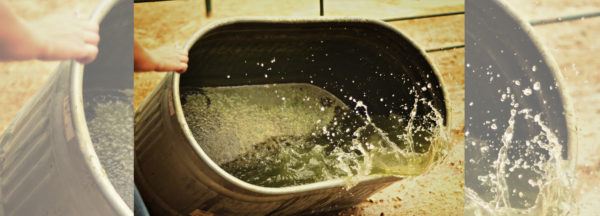Water, West Nile, and Your Horse

By Ritchie Industries
West Nile Virus is a mosquito-born virus that causes encephalitis and/or meningitis and horses are a species that is susceptible to infection. Since the outbreak of West Nile Virus in 1999, there have been tens of thousands confirmed cases of horses infected in the United States and Canada. Of those, approximately 30% die or must be destroyed and another 17% suffer from long-term related debilitation. Due to the high mortality rate, health officials have been warning people to find any sources of standing water and remove it so the mosquitoes will not be able to reproduce. One possible source is the large open stock tanks that livestock, including horses, drink from.
Ponds and large stock tanks in the pasture are the perfect breeding grounds for mosquitoes. The volume of water in the large tanks can range from 50 gallons to 1,500 gallons or more. Many of these tanks are filled automatically with an attached float and valve so that even though horses are drinking, the water is never completely drained. The combination of large amounts of water and automatic refill provides a premium situation to allow mosquito eggs to hatch within 48 hours of being laid.
Birds are attracted to ponds and tanks as well; if they are infected, they can pass the West Nile Virus to mosquitoes where they breed. Because mosquitoes tend not to travel far from where they are born, it is very easy to see how a horse can be a victim of this disease.
Studies have shown that when the surface of the water is disturbed the larvae of the mosquito will swim to the bottom of the water tank. So even though a horse may be drinking, the mosquito larvae will not be removed from the tank or pond. And in a large tank of water, the agitation of the water created from the automatic valve is not enough to disturb or remove the larvae.
To prevent the “egg to hatch” cycle in a large stock tank, it is being recommended that they are drained and cleaned every third day. This can be cumbersome, time consuming and a waste of water, especially in drought-affected areas. However, there are some good alternatives to large open stock tanks and ponds that will greatly reduce mosquito breeding in your horse’s source of water.
The first choice is an automatic waterer where the surface of the water is completely covered at all times, reducing the chance that mosquitoes will lay eggs. These waterers have a ball, elliptical float or disc that float when the horse pushes out of the way to access the water. The elliptical floats or discs tend to work much better for horses and small animals, as they only require a few ounces of pressure to move out of the way. Waterers that feature this type of closure generally are made of tough polyethylene plastic that can withstand a lot of abuse. As an added bonus, the covered, fully insulated plastic design also keeps the water cooler in the summer and helps prevent algae growth, which is typically seen in large open stock tanks.
The second alternative is to install an open surface, automatic waterer that has very shallow water and a quick fill valve. In this case the shallower the better as long as the valve can replenish the water quickly. These waterers will hold as little as 2 gallons at a time and can water up to 40 horses. They are constructed out of plastic, stainless steel or a combination of both. Due to their design, they are easy to clean and because of the shallow water the high fill valve can cause enough agitation to make it difficult for mosquitoes to use this as a breeding area.
In February 2003, the US department of Agriculture (USDA) fully licensed a WNV vaccine for horses. Although there has been some skepticism about the side effects of the vaccine, it has proven to save many. The use of an automatic waterer, covered or open, that is easy to clean and features a small amount of standing water, alone or in combination with the vaccine can greatly improve the protection.
Finally, we have to keep in mind that while we are trying to protect our horses from West Nile Virus, we are trying to protect our families, friends and ourselves as well. Remember, there is no specific treatment for West Nile encephalitis. So take a hard look at how you are watering your horses and livestock and consider installing an automatic waterer that will help reduce the spreading of this terrible disease.
